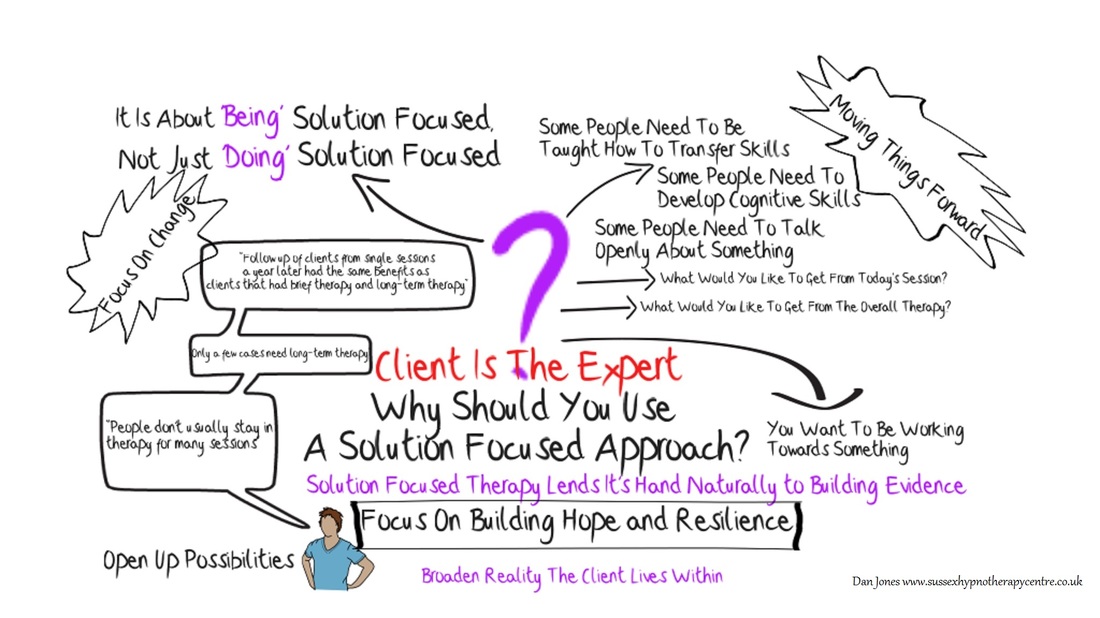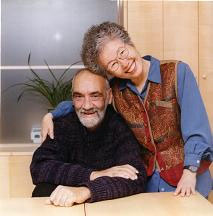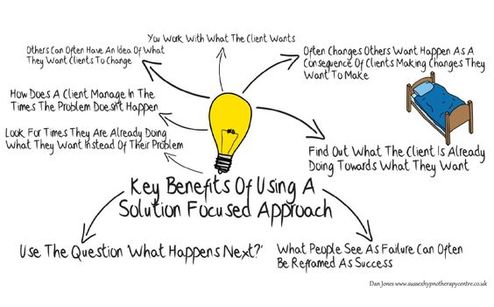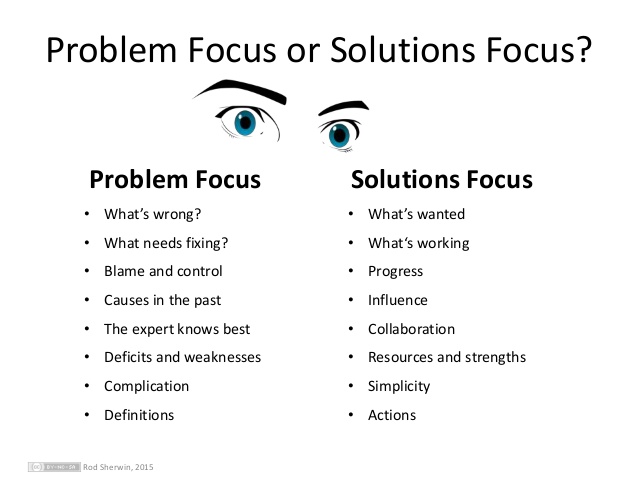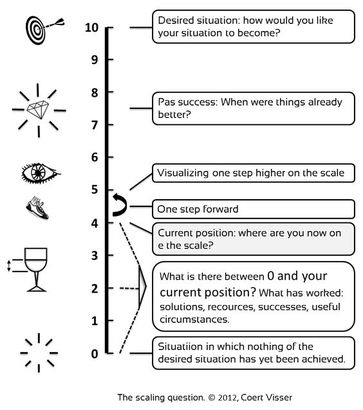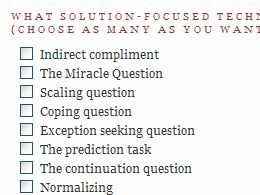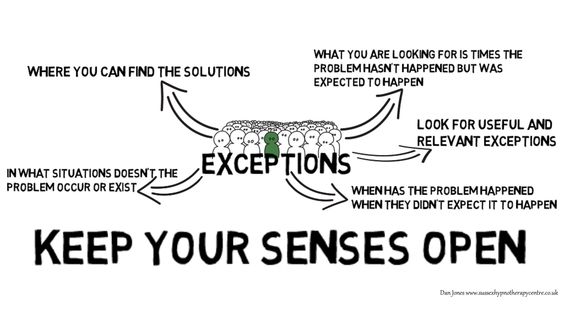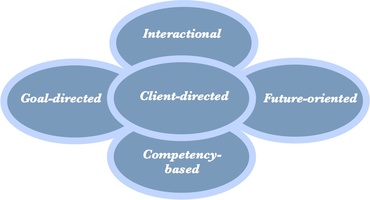 http://blog.ebta.nu/the-solution-focused-modell
http://blog.ebta.nu/the-solution-focused-modell
Way of Being:
Role of the counselor is directive, empathetic, and does not focus on the problem or the past. The counselor leads the client towards personal strength and competencies through respect and acceptances. The counselor uses optimism, validation, and unconditional positive regard. The counselor takes what the client says at face value.
Role of the client is to set goals based on the problem and is the expert of their own life. The client uses strengths that have worked in the past and identifies what is not working now.
Role of the therapeutic relationship is collaborative, in the here-and-now, and equal. The relationship focuses on direct change in positive direction, and is future focused. There is a "rapid working alliance between therapist and client" (Corey, 373).
Role of the counselor is directive, empathetic, and does not focus on the problem or the past. The counselor leads the client towards personal strength and competencies through respect and acceptances. The counselor uses optimism, validation, and unconditional positive regard. The counselor takes what the client says at face value.
Role of the client is to set goals based on the problem and is the expert of their own life. The client uses strengths that have worked in the past and identifies what is not working now.
Role of the therapeutic relationship is collaborative, in the here-and-now, and equal. The relationship focuses on direct change in positive direction, and is future focused. There is a "rapid working alliance between therapist and client" (Corey, 373).
 nbss.ie
nbss.ie
Ways of Understanding:
View of human nature: Humans have strengths and are competent, once the client recognizes it one is able to solve their problem. "There are exceptions to every problem, or times when the problem was absent. By talking about these expectations, clients can get clues to effective solutions and can gain control over what seemed to be an insurmountable personal difficulty. Rapid changes are possible when clients identify expectations instead of around the problem" (Corey, 373). If the therapeutic relationship is corporative and the therapist trust that the client is trying their best to change, then the client will not be resistant. It’s important to take what the client says at face value and to have attainable goals.
View of the problem/maladaptive behavior: Problems occur when clients focus on the past and present problems, instead of focusing on the future. Clients are stuck using ineffective solutions (Sommers-Flanagan, 378). The client is focused on the problem.
View of healthy/adaptive behavior: Clients are competent and able to form solutions.
Goals of theory: is rapid change for the client. "One goal of Solution Focused Brief Therapy is to shift clients' perceptions by reframing their skillful use of language" (Corey, 372). The client and counselor focuses on small attainable goals that the client sets with assistance. The therapy's ultimate goal is termination.
Key concepts: The theory focuses on solutions, instead of the client’s problems. The therapist is not interested in knowing what caused the problem or the past. The therapy has a positive/optimistic orientation that is empowering to the client, by emphasizing the client's strengths. The therapy last for only 3 to 8 sessions.
Views of therapeutic change is client's behavior change. The client is aware of their strengths, expectations, and think positively. The client and therapist discover what is working and encourage behavior. The client's small goals are being achieved.
View of human nature: Humans have strengths and are competent, once the client recognizes it one is able to solve their problem. "There are exceptions to every problem, or times when the problem was absent. By talking about these expectations, clients can get clues to effective solutions and can gain control over what seemed to be an insurmountable personal difficulty. Rapid changes are possible when clients identify expectations instead of around the problem" (Corey, 373). If the therapeutic relationship is corporative and the therapist trust that the client is trying their best to change, then the client will not be resistant. It’s important to take what the client says at face value and to have attainable goals.
View of the problem/maladaptive behavior: Problems occur when clients focus on the past and present problems, instead of focusing on the future. Clients are stuck using ineffective solutions (Sommers-Flanagan, 378). The client is focused on the problem.
View of healthy/adaptive behavior: Clients are competent and able to form solutions.
Goals of theory: is rapid change for the client. "One goal of Solution Focused Brief Therapy is to shift clients' perceptions by reframing their skillful use of language" (Corey, 372). The client and counselor focuses on small attainable goals that the client sets with assistance. The therapy's ultimate goal is termination.
Key concepts: The theory focuses on solutions, instead of the client’s problems. The therapist is not interested in knowing what caused the problem or the past. The therapy has a positive/optimistic orientation that is empowering to the client, by emphasizing the client's strengths. The therapy last for only 3 to 8 sessions.
Views of therapeutic change is client's behavior change. The client is aware of their strengths, expectations, and think positively. The client and therapist discover what is working and encourage behavior. The client's small goals are being achieved.
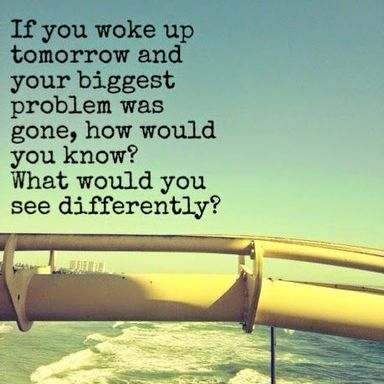 http://beatingthesocialworkexam.blogspot.com/2014/04/4-descriptions-of-solution-focused.html
http://beatingthesocialworkexam.blogspot.com/2014/04/4-descriptions-of-solution-focused.html
Ways of Intervening:
Techniques: Pre-therapy Change - what has changed in the client's life since scheduling the initial appointment? This brings awareness to positive change that is occurring just by making an appointment. Exception Questions-Is when the problem did not occur during a situation the client thought the problem would occur. This technique is to show the client the problem does not always exist or as intense in previous experiences. The Miracle Question- "If a miracle happened and the problem you have was solved overnight, how would you know it was solved, and what would be different? What would you be doing differently?" (Corey, 378). This technique is future focused; it allows the client to image what their life would be like with the change and helps give the client a clear focus on the goals. Scaling Questions- This has the client evaluate their mood, feeling, and/or behavior and give a number to it. Have a clear number on the emotion/behavior helps bring awareness to the client that they are not defeated and can change it. Formula First Session Task- it is usually homework that evaluates what the client wants to change, what the client likes, and what does the client want their future to look like. Therapist Feedback to Clients- During the summary at the end of the session, the therapist gives feedback through a compliment (affirmation that is leading towards the solution), a bridge (connects the compliment with the task), and suggesting task (homework). Terminating- "From the very first solution-focused interview, the therapist is mindful of working toward termination. Once clients are able to construct a satisfactory solution, the therapeutic relationship can be terminated" (Corey, 379).
Multicultural considerations: Solution focused therapy emphasizes on respect, validation, personal language, culture, and individual's construction or reality. The therapy focuses on externalization and social factors, but could be considered insensitive due to lack of interest in the problem and short duration.
Population: This theory would work well with individual clients because one will gain insight on their strengths and competencies. Solution focused therapy also focuses on the individual's externalization and social factors.
Limitations is that it is a very short therapy, only 3 to 8 sessions. Therapy also a little evidence based research to demonstrate the effectiveness of the therapy.
Techniques: Pre-therapy Change - what has changed in the client's life since scheduling the initial appointment? This brings awareness to positive change that is occurring just by making an appointment. Exception Questions-Is when the problem did not occur during a situation the client thought the problem would occur. This technique is to show the client the problem does not always exist or as intense in previous experiences. The Miracle Question- "If a miracle happened and the problem you have was solved overnight, how would you know it was solved, and what would be different? What would you be doing differently?" (Corey, 378). This technique is future focused; it allows the client to image what their life would be like with the change and helps give the client a clear focus on the goals. Scaling Questions- This has the client evaluate their mood, feeling, and/or behavior and give a number to it. Have a clear number on the emotion/behavior helps bring awareness to the client that they are not defeated and can change it. Formula First Session Task- it is usually homework that evaluates what the client wants to change, what the client likes, and what does the client want their future to look like. Therapist Feedback to Clients- During the summary at the end of the session, the therapist gives feedback through a compliment (affirmation that is leading towards the solution), a bridge (connects the compliment with the task), and suggesting task (homework). Terminating- "From the very first solution-focused interview, the therapist is mindful of working toward termination. Once clients are able to construct a satisfactory solution, the therapeutic relationship can be terminated" (Corey, 379).
Multicultural considerations: Solution focused therapy emphasizes on respect, validation, personal language, culture, and individual's construction or reality. The therapy focuses on externalization and social factors, but could be considered insensitive due to lack of interest in the problem and short duration.
Population: This theory would work well with individual clients because one will gain insight on their strengths and competencies. Solution focused therapy also focuses on the individual's externalization and social factors.
Limitations is that it is a very short therapy, only 3 to 8 sessions. Therapy also a little evidence based research to demonstrate the effectiveness of the therapy.
